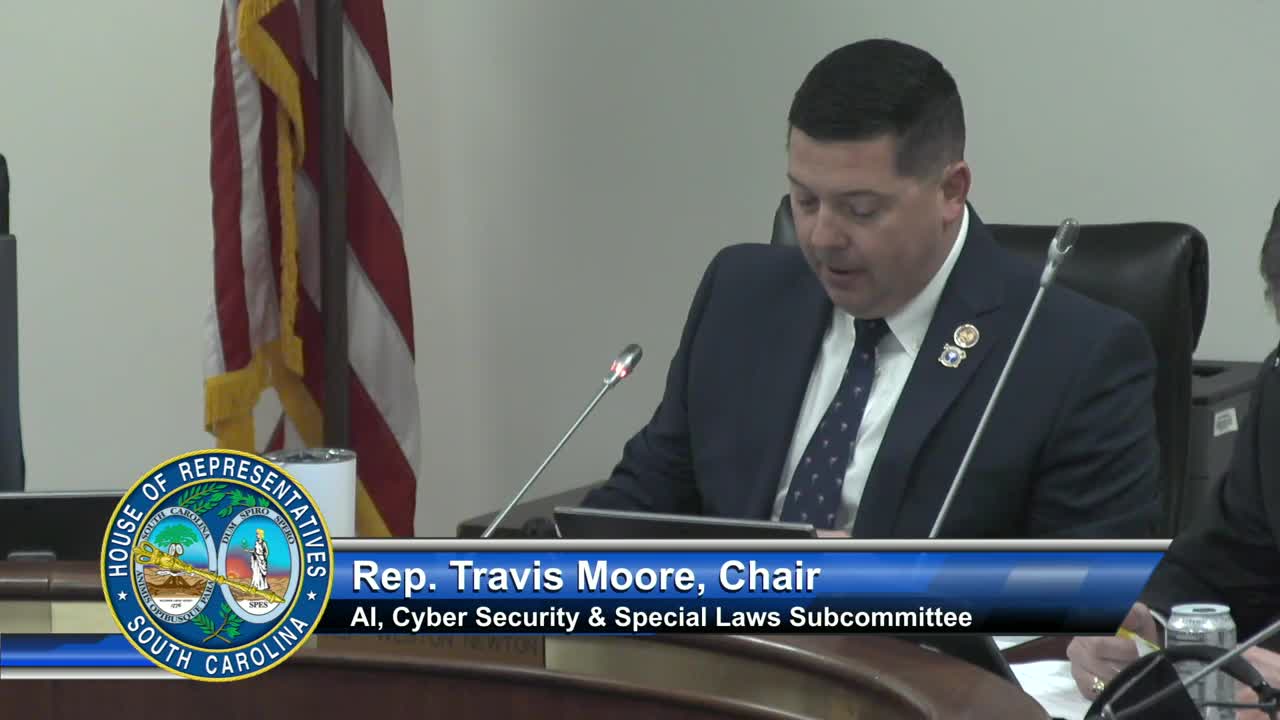Subcommittee advances bill creating criminal penalties for nonconsensual intimate images (H3058)
Get AI-powered insights, summaries, and transcripts
Subscribe
Summary
The artificial intelligence, cybersecurity and special law subcommittee voted 3-0 to give House Bill H3058 a favorable report as amended. The bill would create criminal penalties for knowingly sharing intimate images or AI-altered intimate images without consent.
The artificial intelligence, cybersecurity and special law subcommittee voted 3-0 to give House Bill H3058 a favorable report as amended. The bill would create new criminal penalties for knowingly sharing an intimate image or a digitally forged intimate image of an identifiable person without that person’s effective consent.
The bill’s sponsors and subcommittee members said the measure is intended to address nonconsensual distribution of intimate images—commonly described as “revenge pornography”—and to close a gap that does not currently cover images altered or generated with machine-learning tools. Representative Travis Moore, chair of the subcommittee, described the bill as an effort to “address the problem of the dissemination of what’s commonly referred to as revenge pornography” and noted that the bill’s definition is drafted to include images “substantially modified using machine learning techniques.”
Under the bill as amended, an intimate image is a still or video image of an identifiable person that depicts exposed intimate body parts, bodily fluids, or sexual conduct. A digitally forged intimate image is an altered or fabricated image that falsely depicts an individual in an intimate manner, including images generated or substantially modified using machine-learning or other computer-generated techniques. The measure makes it an offense to knowingly share such an image without the depicted person’s effective consent when the violator knows or has reason to know the person had a reasonable expectation of privacy.
The amendment the subcommittee adopted narrows certain defenses and establishes a misdemeanor/felony distinction based on intent. The amendment clarifies that: consenting to the creation of an image does not imply consent to its dissemination; prior sharing of an image with a particular person does not automatically permit further distribution by others; and multiple images created or disseminated as part of a single act count as a single offense rather than multiple separate offenses. The amendment also makes unauthorized dissemination a felony when done with intent to cause physical, mental, economic or reputational harm or for financial gain, and classifies other unauthorized dissemination without such intent as a misdemeanor.
Penalties summarized from the bill and the adopted amendment: a first offense felony carries up to five years in prison and a fine of up to $5,000; a second or subsequent felony conviction carries prison from one to 10 years and fines of up to $10,000. Misdemeanor-level unauthorized dissemination carries up to one year in jail and fines up to $5,000; the amendment includes provisions for escalation on repeat offenses. The bill also allows separate charges in some circumstances but the amendment limits counting multiple images from the same incident as separate offenses. The bill includes an exception permitting law enforcement to create or use intimate or digitally forged images during lawful criminal investigations and prohibits duplicating such images for criminal discovery purposes.
Representative Wootton, the sponsor previously identified with this measure, urged adoption of the amendment and said the bill addresses harms that can have lifelong consequences for victims. “It’s sad that we have to be in this situation,” he said, noting personal concerns about the impact on children and families. Representative Wootton also described the amendment as distinguishing between harmful intent and situations where an image may be shared without intent to harm.
Committee members asked several hypotheticals during debate—about images posted publicly or on paid platforms such as OnlyFans, about pictures taken abroad, and about how reasonable expectation of privacy should be assessed. Members and staff repeatedly emphasized that the bill requires proof of the defendant’s state of mind (for example, intent to cause harm) for the most serious charges, and that prosecutorial discretion would determine whether a particular fact pattern merited criminal prosecution.
The subcommittee adopted the amendment by voice vote after discussion and then ordered a roll-call vote on the bill as amended. Representative Travis Moore, Representative Ryan McCabe, and Representative Paul Wickenheimer all recorded “aye” on the roll call. With three in favor and none opposed, House Bill H3058 received a favorable report from the subcommittee as amended.
The subcommittee discussion indicated the panel will transmit the amended bill to the next committee or floor with the changes adopted in subcommittee; members and staff said they expect the bill to be considered further at full committee and on the chamber floor.
